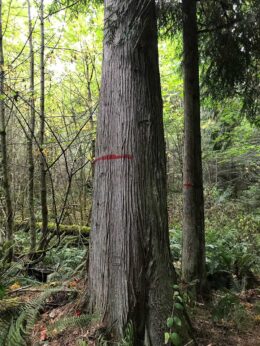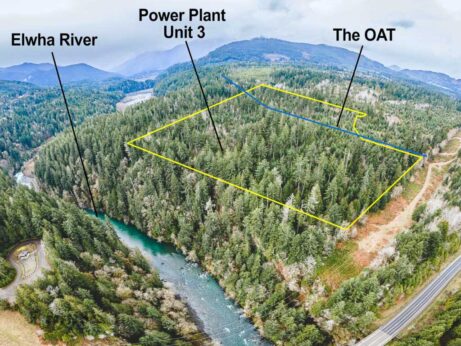
PORT ANGELES, Wash.—Earth Law Center leader Elizabeth Dunne led nature lovers to the banks of the Elwha River here on Sunday, Sept. 24, to protest plans to log a mature forest in the watershed of the river that provides all the drinking water for this city.
Dunne, an attorney, told the crowd it was “World River Day” and thanked them for joining in celebration of the Elwha. The removal of the Elwha’s two dams, at a cost of $340 million, has become a model for reclaiming rivers here in the U.S. and around the world. The Lower Elwha Klallam Tribe led that struggle.
Hikers held signs that proclaimed, “World River Day: Love the Elwha, River of Life.” Another read, “Save the Elwha…We Drink It. Salmon Swim It.”
Two elected officials joined the World River Day hike—Port Angeles City Council member Navarra Carr, seeking re-election on Nov. 7, and Wendy Rae Johnson, Clallam County Conservation Commissioner.
Sam Woods, a disabled IBEW electrician, brought his salmon carved from virgin cedar, the exact size of a King salmon caught in Alaska, the largest anywhere. “They used to catch 100-pound salmon right here in the Elwha before the dams wiped them out,” Woods said.
Ellen Menshew, an activist with Puget Sound Advocates for Retirement Action (PSARA), told the crowd the Clallam County Democratic Party and the Legislative District-24 (LD-24) Democrats approved a resolution calling on Public Lands Commissioner Hilary Franz, head of the Department of Natural Resources (DNR), to delay or cancel the Elwha timber sale.
PSARA member Lisa Dekker told the crowd she is active in the movement to save Orca whales, whose survival depends on preserving the salmon. She drew laughter when she reported that she dresses up in an Orca costume at local environmental street events.
The crowd walked down the Colville Trail into the forest that the Murphy Company of Eugene, Ore., plans to log in the near future.

Dunne pointed to trees marked with spray paint to be logged. Some were 40 to 50 inches in diameter—legacy trees in everything but name—Douglas fir, hemlock, red cedar.
A few feet east of the trail, the land falls steeply, the roar of the Elwha audible less than 200 feet below. “These trees are right next to this bluff,” she said. “DNR’s position is that they didn’t need to prepare a written report as to the geology and how cutting down these trees could affect this steep hillside. Log these big trees and there could be landslides, and soil erosion, that could negatively impact the river.”
In an interview, Conservation Commissioner Johnson told People’s World, “The connection between legacy forests and the climate is immense. Preserving the forests is key to the sequestration of carbon dioxide and combatting global warming.”
She predicted that clear-cutting timber like the Power Plant Unit 3 and the nearby Aldwell timber tract a mile or so upstream—already clear-cut—will release carbon dioxide that would have been stored if the trees were left standing. She pointed out that industrial logging now creates a handful of jobs, usually three or four heavy equipment operators, in this case, from Oregon.
“After logging, they spray herbicides so they can plant a mono-crop, usually Douglas fir. They will turn this into a tree plantation. In nature, there is no mono-cropping. There is diversity.” She stressed that she was expressing her personal views, not speaking for the Conservation District.
Franz has already approved the timber sale for $657,000, although opponents say she can still cancel it. A total of $217,258 is earmarked for Port Angeles School District (SD) 121 of which a mere $75,265 is for “operating costs.” The rest goes to pay off past bond debt.
That $75,265 is a tiny fraction of the actual cost of the new middle school SD-121 is planning to build.
Earth Law Center has filed a lawsuit along with co-plaintiffs Center for Whale Research (founded by the renowned researcher Ken Balcomb) and Keystone Species Alliance seeking to halt the Power Plant Unit 3 logging.
Early on, a Clallam County judge rejected an injunction to delay the logging. But the case is far from over. The parties have yet to brief the case and have a hearing on Earth Law’s charges that DNR failed to investigate the negative environmental impacts of the Power Plant Unit 3 logging.
Sandy Macleod, a retired early childhood educator, said she and her husband moved to Clallam County in 2015 from Salt Lake City, Utah.

“It is so green here, the rivers, the mountains,” she said. “It was so bold, so visionary to blow up those dams, to restore the river and the salmon. And now we have this step backwards in the wrong direction to log this forest.”
LaTrisha Suggs, a member of the Port Angeles City Council and also a member of the Lower Elwha Klallam Tribe, said, “Everybody has done something for the benefit of the watershed. I think it is time that the Washington State DNR step up and do the same thing.”
Suggs voted for the unanimous City Council resolution calling on Franz to delay or cancel the sale.
A prolonged drought has reduced Elwha flow to a relative trickle. The City of Port Angeles has declared a “Stage III Water Shortage,” prohibiting all non-essential water use. A lightning storm in the Olympic Mountains triggered seven forest fires filling the air with smoke. Climate change now puts at risk the drinking water and air—not the time, critics say, to clearcut the Elwha watershed.
Port Angeles Mayor Kate Dexter and City Manager Nathan West wrote to Franz last summer urging her to halt the logging. They wrote: “Logging these forests compromises efforts to restore endangered and recovering species, destroys essential carbon sinks, and threatens Port Angeles’ sole drinking water source.”










